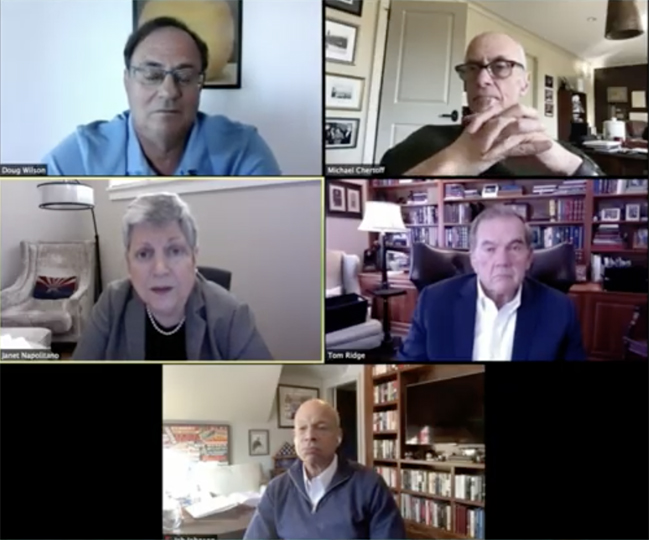
Having recently entered the White House, the Biden-Harris administration faces a potent mix of threats to national security. On February 4, 2020 the UC Berkeley Goldman School of Public Policy held a virtual conversation to examine how current threats to national security should be handled.
The discussion, moderated by former Assistant Secretary of Defense Douglas B. Wilson, featured four panelists with unique expertise on the issue of national security. Tom Ridge and Michael Chertoff, two of the four panelists, served as Secretaries of the Department of Homeland Security under President George W. Bush. Janet Napolitano and Jeh Johnson, the other two panelists, served as Secretaries of the Department of Homeland Security during the Obama administration.
After briefly introducing each speaker, Wilson opened the conversation by describing the current state of threats to national security. He emphasized the danger of right-wing extremist movements and the growing threat of domestic terrorism.
“At the Department of Homeland Security’s inception, the focus was on international terrorism—particularly jihadism,” Wilson said. “All that has changed over the past year, with tensions reaching their peak in our most recent election.”
Ridge and Napolitano were the first panelists to speak, both highlighting what they saw as the most significant issues facing the Department of Homeland Security. They agreed that the current collection of domestic and international threats—from Russia and China’s growing aggressiveness to domestic acts of political violence—were the most complex in modern history.
“DHS is coming out of a four-year period of incredibly high turnover, swaths of vacant positions, and no apparent strategic direction,” Napolitano said. “At a time when national security is under immense threat, the Department has been weakened.”
Chertoff seconded Napolitano’s worries, adding that the politicization of the Department of Homeland Security was another major issue.
“One of the Department’s biggest goals needs to be rebuilding the trust of the American people.” Chertoff said. “During the Trump administration, child separation policies and other actions ruptured people’s confidence in the Department being non-political.”
Chertoff also cautioned against recent suggestions to implement a statute of limitations on domestic terrorism, arguing that the Department would need to carefully avoid encroaching on the First Amendment.
The discussion then turned to issues of racism and white supremacy, with Johnson identifying what he saw as the root of extremist political movements.
“I hate to say this about our country, but there is a strand of our society that is racist, intolerant, and prone to violence,” Johnson said. “That’s what we saw on January 6.”
Ridge and Napolitano also voiced their support for Defense Secretary Lloyd Austin’s plan to identify and remove covert extremists within the military and law enforcement.
Chertoff and Johnson recommended that DHS work more closely with state and local law enforcement groups to combat domestic terrorist threats.
“DHS is not equipped to adequately deal with [this threat],” Johnson said. “It was created in 2002 based on ther assumption that terrorism came from beyond our borders, but the principal threat is now domestic-based.”
Napolitano and Johnson added that social media platforms had played a role in fomenting domestic terrorism. Both argued that DHS should not, however, take steps to police or censor information on social media.
“Social media platforms are more than just conduits of information; they have the ability to push certain messages towards us,” Johnson said. “Changes certainly need to be made, but I think giving government agencies power over political expression on social media is a dangerous road to go down.”
Offering an alternative solution, Napolitano suggested that the threat of legal liability could force social media companies to halt the spread of disinformation, violent posts, and intolerant language on their platforms.
All four panelists agreed that the Biden-Harris administration faces a uniquely-challenging set of national security threats. They explained, however, that they had faith in national security officials’ ability to meet current challenges.
–Mattias Hoz
All League News

